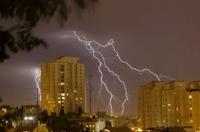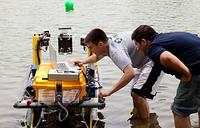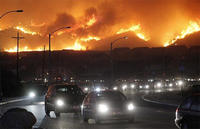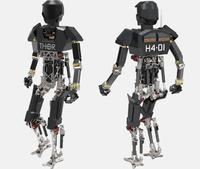-
Houston, Texas boasts world’s best lightning detection system

With thousands of strikes each year, Houston is the lightning center of Texas and one of the world’s most lightning-prone areas. Studies show about 1,800 thunderstorms pound the Earth at any given moment, resulting in about fifty lightning strikes every second. The country’s best system to detect lightning strikes — located in and around the Houston area — just got better, thanks to a complete overhaul and new software.
-
-
Student teams compete in U.S. Navy’s RoboBoat competition

In a race against one another and the clock, robotic boats are battling it out at the 6th International RoboBoat Competition, which began 8 July and ends 14 July. The Office of Naval Research (ONR)-co-sponsored competition takes place on a pond at the Founder’s Inn and Spa in Virginia Beach, Virginia. The event features fifteen student teams racing their custom-designed and built boats.
-
-
DARPA’s disaster robot competition moves to final stage

On Monday, 8 July 2013, the seven teams which progressed from DARPA’s Virtual Robotics Challenge (VRC) arrived at the headquarters of Boston Dynamics in Waltham, Massachusetts to meet and learn about their new teammate, the ATLAS robot. ATLAS is one of the most advanced humanoid robots ever built, but is essentially a physical shell for the software brains and nerves that the teams will continue to develop and refine. The robot will have to perform a series of tasks similar to what might be required in a disaster response scenario.
-
-
Navy drone lands on ship without human assistance
A U.S. Navyexperimental drone has executed several landings on the USS George H.W. Bush, marking an advance in robotic aviation. The drone calculated, without human assistance, how fast to approach the ship, when to put its wheels down, and when to hit the brakes.
-
-
U.S. Emergency Alerting System (EAS) vulnerable to hacking
The U.S. Emergency Alerting System (EAS) is designed to allow for quick alerts during an emergency. Researchers uncovered vulnerabilities in the digital alerting systems, vulnerabilities which allow an attacker remotely to log in over the Internet and manipulate any system function. The attacker could disrupt a TV or radio station’s ability to transmit and could disseminate false emergency information.
-
-
Russia: Syria rebels used sarin gas
Vitaly Churkin, Russia’s UN ambassador, announced at a UN news conference Tuesday that scientific analysis by Russian labs of a suspected chemical weapons attack in Syria on 19 March concluded the attack probably had been carried out by rebels using sarin nerve gas of “cottage industry” quality. He said the gas was delivered by a crudely made missile.
-
-
Advancements in technology making it easier to fight wildfires
Following the Arizona wildfire disaster, many have been suggesting that new regulations are needed to control the spread of wildfires. Experts say that advancements in technology may well offer a more effective approach to saving lives and making it easier for firefighters to control wild blazes.
-
-
Firefighting experts calling for easing environmental restrictions on prescribed burns
In the aftermath of the Arizona wildfire which killed nineteen firefighters in Yarnell, Arizona, there are growing calls for easing environmental restrictions which currently limit brush clearing and prescribed burns. It typically costs $5 per acre to conduct a prescribed burn in the wilderness, and about $50 per acre near residential areas. Thinning an area with chain saws and other equipment can cost around $500 per acre. These figures are small when compared to the $1,200 per acre cost of fighting the wildfire in Arizona.
-
-
CBP drones may be armed with non-lethal weapons
Customs and Border Protection (CBP) currently has eight Predator drones used on the northern and southern borders, and two more drones watching the Caribbean. The drones are equipped with high-tech cameras. Critics say drones are not an efficient way to monitor the border, and that they lead to few arrests and seizures. Other critics are worry about something else: a recent CBP report show that the agency is considering arming these drones with “expendables or non-lethal weapons designed to immobilize [targets of interest].”
-
-
Highly portable X-ray imaging system developed
Los Alamos National Laboratory and Tribogenics have developed the MiniMAX (Miniature, Mobile, Agile, X-ray) camera to provide real-time inspection of sealed containers and facilities.MiniMAX is an alternative to the large, expensive, and fixed facilities presently required for security inspections using X-ray imaging. The complete MiniMAX portable radiography system weighs less than five pounds.
-
-
Gauging how residents in storm-prone regions react in the event of an imminent storm

StormView software program gauges how residents of hurricane-prone regions react to warnings and prepare for storms. The program is designed to be as realistic as possible in order accurately to assess how people would react in the event of an imminent storm.
-
-
Obama says Arizona wildfire deaths open up broader questions

President Barack Obama said on Monday that several states need to reassess their wildfire management policies in the aftermath of the death of the nineteen firefighters who died battling an Arizona blaze.
-
-
The differences between impulsive and predatory murderers
A pioneering study finds distinct differences between two types of murderers: impulsive murderers and predatory, or premeditated, murderers. Impulsive murderers were much more mentally impaired, particularly cognitively impaired, while predatory or premeditated murderers exhibit deeper psychiatric disorders.
-
-
Remote-controlled cockroaches to help in search-and-rescue missions
Researchers are using video game technology to remotely control cockroaches on autopilot, with a computer steering the cockroach through a controlled environment. The researchers are using the technology to track how roaches respond to the remote control, with the goal of developing ways that roaches on autopilot can be used to map dynamic environments — such as collapsed buildings.
-
-
Robots to assist humans in mitigating, recovering from future natural and man-made disasters

The goal of DARPA Robotics Challenge (DRC) is spur development of advanced robots that can assist humans in mitigating and recovering from future natural and man-made disasters. Seven teams will receive DARPA support to compete with an ATLAS Robot in 2013.
-
More headlines
The long view
Why Ukraine’s AI Drones Aren’t a Breakthrough Yet
Machine vision, a form of AI, allows drones to identify and strike targets autonomously. The drones can’t be jammed, and they don’t need continuous monitoring by operators. Despite early hopes, the technology has not yet become a game-changing feature of Ukraine’s battlefield drones. But its time will come.
